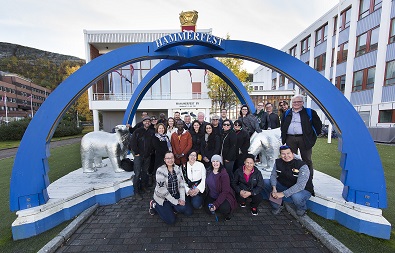ICNGD graduate students and staff at field school in Norway in the fall. Photo courtesy @UiTromsoHSL, Twitter.
This is the first story in a multi-part series on the International Centre for Northern Governance and Development.
Northern master’s program students are speaking out after the province stopped all funding for their University of Saskatchewan program “with no advanced warning,” according to the university’s interim provost.
Provost Michael Atkinson is one of many who were “shocked” when the provincial budget completely eliminated $1.1 million in funding for the International Centre for Northern Governance and Development (ICNGD), which amounts to about 85 per cent of the centre’s funding.
When asked how staff at the ICNGD are responding, he said “it’s really, I think, demoralizing to have the funding kind of snatched away all at once.”
Pinehouse Lake teacher Billie-Jo Natomagan is a few months away from finishing her Masters in Northern Governance through the ICNGD, and said the provincial budget did a number on northern education.
“So I’m a NORTEP grad as well, and I’m a parent, and I’m raising my children in northern Saskatchewan so I feel like the education system in the north, we’re becoming further marginalized,” she said.
In response to an interview request, a provincial government spokesperson provided a statement saying “targeted funding for the International Centre for Northern Governance Development program was originally provided for start-up purposes. A key feature of the program was collaboration with other institutions and partners.”
Atkinson said, considering the high cost of delivering ICNGD’s programs, the U of S would not have started the program without government funding. He is unsure of what the province expects the school to do now, but “it’s very hard to imagine how we can offer this kind of program the way we have offered it without continuous government funding.”
Atkinson has tasked the ICNGD-affiliated Johnson-Shoyama Graduate School for Public Policy and Environment and Sustainability school with finding whether the ICNGD’s two master programs can be sustained. More than 50 northerners have received their masters since the ICNGD launched in 2009.
“We haven’t by any means closed the door on the ICNGD” at this time, Atkinson said, adding that the university will ensure the 34 people currently enrolled in master’s programs will be able to complete them.
Pinehouse Lake elementary school’s principal Rosalina Smith is one of those current students, and said the program’s unique partnership that sees students go to Norway to study that country’s entrepreneurship and economic development opens their eyes to opportunities back at home.
“Those are some things that could become reality in the north because as we all know, we’re living in an environment where we have a lot of non-renewable resources and eventually we’re not going to have those resources. So what are we going to turn to? We need to start preparing our people,” she said.
She is currently getting ready to do her final master’s research project on how to improve graduation rates for Aboriginal people.
Even now, Smith said the program has already helped her directly contribute to her community as she reviewed Pinehouse’s collaboration agreement with Cameco, exploring whether or not they are beneficial to residents and what could improve those agreements.
“I was able to provide some guidance and some leadership in the whole area of collaboration agreements,” she said.
Smith said she has also been able to assist trappers and fishers negotiate a logging agreement.
At present, the Johnson-Shomoya school has not provided an update on its research into the options for ICNGD’s future.
